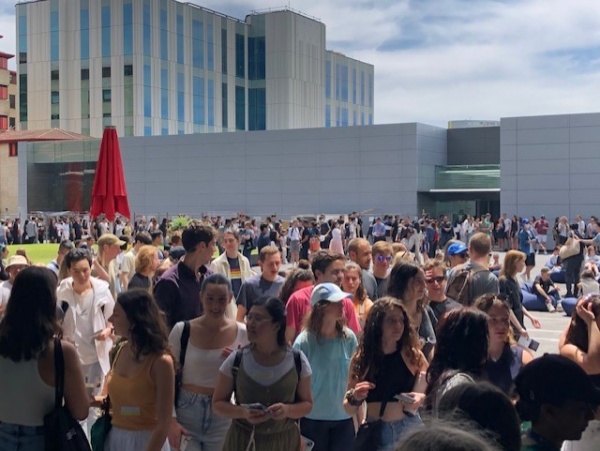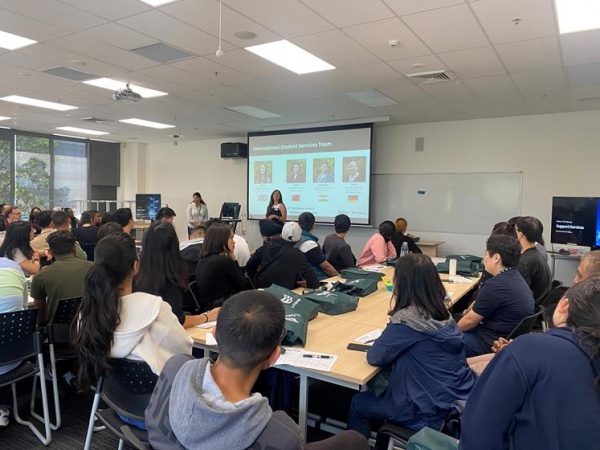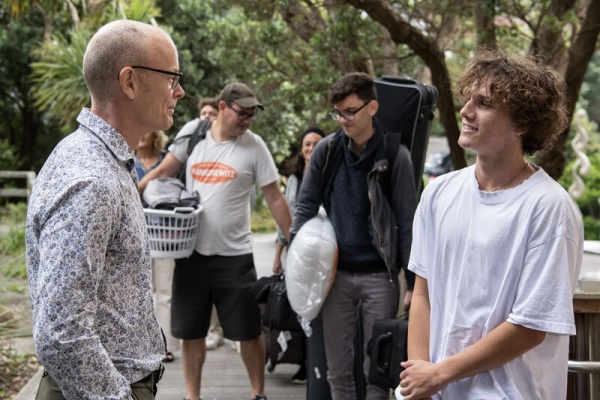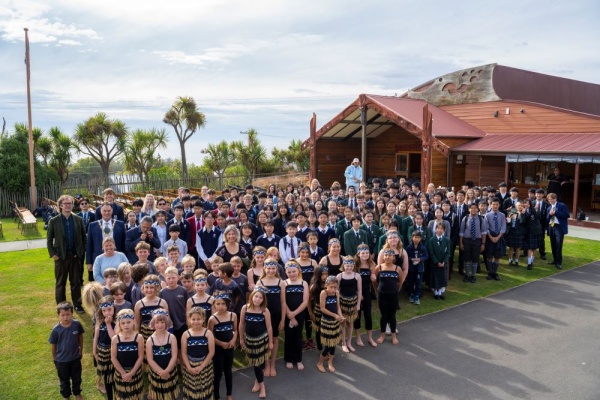Search
Showing 10 of 6391 results
-
Growing New Zealand’s education connections in the Middle East
ENZ participated in the re-opening ceremony and stressed the importance of education connections between New Zealand and Saudi Arabia to a 300-strong audience.
A rousing performance of ENZ’s waiata – Manapou ki te Ao – by Ngāti Koraha, a kapa haka group based in Dubai, supported the embassy’s re-opening ceremony.
The event took place in the same week that University of Otago alumna, Rayyanah Barnawi, made the news as she is set to be Saudi Arabia’s first woman astronaut in space when she travels to the International Space Station later this year.
The visit was a useful opportunity to engage on education with Saudi Arabian government officials and to discuss G2G opportunities with NZ Inc agencies in the wider Middle East region.
ENZ’s Senior Advisor for the Middle East, Bronwyn Shanks, said the visit has been valuable in the way it has helped ENZ to lay the groundwork for an education delegation to the Middle East, including Oman, the United Arab Emirates, and Saudi Arabia in May.
“We understand the significance of the Middle East region for our education sector, particularly Te Pūkenga, universities, English language schools and edtech companies.
“We’re building knowledge and connections on the ground that can help open doors for New Zealand education providers looking to grow their links in the region and look forward to supporting them with a high-level education delegation visit.”

ENZ’s Bronwyn Shanks speaking at the New Zealand Embassy re-opening event, with Ngāti Koraha kapa haka group in support
Alongside the embassy’s re-opening event in Riyadh, ENZ and representatives from the University of Waikato and the University of Auckland met with Saudi government connections, including the National Institute for Educational Professional Development (NIEPD), Technical and Vocational Training Corporation (TVTC), Ministry of Culture, and Ministry of Tourism.
The discussions’ focus was on how New Zealand education providers could support Saudi Arabia’s efforts towards upskilling their young people under Vision 2030.
“It was great to meet some of those young alumni hosted by the University of Waikato and hear about the positive impact their New Zealand education experience continues to have now they are back in Saudi Arabia,” Shanks said.
ENZ and the University of Waikato also visited the University of Wollongong in Dubai, one of a network of study centres under university consortium NCUK, with which ENZ and all eight New Zealand universities have a partnership agreement to provide in-country foundation programmes.
Education providers interested in knowing more about education engagement in the region can contact ENZ’s Senior Advisor for the Middle East, Bronwyn Shanks, on bronwyn.shanks@enz.govt.nz.
-
Join ENZ’s virtual Latin America regional update
The session – set to take place on Wednesday 5 April at 9 am NZT – is an opportunity for those who are both new to the sector, or wanting to re-establish links in the region, to hear updates from our LatAm team.
As the New Zealand international education sector rebuilds, Latin America provides New Zealand institutions with an opportunity for diversification. New Zealand has well-established links in the region, with many strong connections in the fields of education, academic research, government, business, and agriculture.
Following the re-opening of borders in 2022, New Zealand has recently welcomed high school student groups on exchange from Brazil and Colombia. In turn, New Zealand students have travelled to Latin America as part of the Prime Minister’s Scholarships for Latin America, participating in study tours and exchanges in Chile, Brazil, Colombia, and Mexico.
To learn more about the Latin America region, be sure to register for the session on this link
For more information about international education in the LatAm region, contact latinamerica@enz.govt.nz.
-
First marae-led Prime Minister’s Scholarships for Asia recipients build indigenous connections in Japan
The first marae-led Prime Minister’s Scholarships for Asia recipients (members of Te Piruru Papakainga, Ngāti Maniapoto) visited Japan for a six-week visit that included a customised internship that connected them with indigenous Ainu organisations and villages in Hokkaido.
ENZ’s Manukura Chief Advisor Māori, Ed Tuari and Director of Education – Japan, Misa Kitaoka, welcomed the scholarship recipients in Tokyo in early January.
This is a great outcome for the Prime Minister’s Scholarship Programme, which has seen an increase in Māori participation. The latest round of applications for the scholarships saw an increase in Māori participation to 22 percent in 2022 from 5 percent from 2016 to 2019.
ENZ is eager to continue partnering with iwi, marae and whānau groups to raise Māori participation in the Prime Minister’s Scholarship programme, particularly in the current group round that opened for applications in March.
ENZ’s Manukura Chief Advisor Māori, Ed Tuari said it was a privilege to participate in what is an important milestone for building indigenous connections between Māori and the Ainu people of Japan.
“This is a significant achievement for ENZ Manapou ki te Ao. I want to acknowledge this collective achievement as we break new ground with this marae-led group of PMSA recipients.
“It’s hugely encouraging to see the increase of Māori participation in the latest round of the scholarships. This is a demonstration of ENZ ‘walking the talk’ to ensure Māori are better represented in opportunities to share and learn on the global stage, as well as promote indigenous to indigenous exchanges.”
ENZ’s Director Scholarships Carla Rey Vasquez said she was excited to see the growth and learnings that these programmes would bring to the wider whānau and iwi.
“Our scholarship recipients cherished the opportunity to connect with indigenous communities in Japan, and they particularly appreciated the value of reciprocity as well as the importance of generational knowledge being shared along.
“We look forward to continuing to raise Māori participation in the Prime Minister’s Scholarship programme.”
The latest visit by scholarship recipients has also been a good opportunity to enrich the existing education connections between New Zealand and Japan under a Memorandum of Understanding between New Zealand and the Hokkaido Government, which was renewed in 2022.
The customised internship that saw scholarship recipients visit Ainu villages and organisations, was organised by the Hokkaido Government and the Hokkaido Board of Education.
ENZ’s Director of Education – Japan, Misa Kitaoka, said the visit by scholarship recipients was timely as Japan starts to promote Ainu history, language and culture.
“The Ainu people received official recognition as ‘indigenous people of northern Japan’ from the Japanese government in 2019. As the government begins to promote Ainu history, language, and culture in Japan, Ngāti Maniapoto’s visit to Hokkaido was timely and appreciated by the Ainu community to learn about how New Zealand society has embraced Māori language and culture.”
Applications are open for the 2023 group round of the Prime Minister’s Scholarships for Asia and Latin America until 23 April 2023. More information on applications is available on ENZ's dedicated scholarship website here.
[updated 18 April 2023]
-
Rebuilding New Zealand education’s visibility in China
Last month, Lillian spent three weeks in New Zealand in what was her first visit to the country as part of her role at Education New Zealand Manapou ki te Ao.
The two-pronged purpose of her trip was to provide refreshed marketing insights to education providers in New Zealand and hear from providers on their expectations and the challenges they face when marketing their offering in China.
Here are Lillian’s takeaways from her visits and interactions in New Zealand –
Need for storytelling that better highlights New Zealand education’s points of difference
- Engaging with education providers and visiting campuses highlighted to me several points of difference for New Zealand education, particularly how it is innovative, how it develops work-ready graduates, as well as how international students are welcomed and valued in New Zealand. Seeing these points of difference in real time made me realise how underrated the New Zealand education story is overseas, and the need to tell that story better. We need to focus on telling a New Zealand education story that is authentic and has concrete examples. A more visual storytelling format would be ideal to deliver the story.
- Tip: Demonstrate the teaching and student engagement practices your institution delivers using visuals (images or videos).
- Example: Take photos/videos in the lab, with robotics machines, with the 3D printer, the hands-on experience and student engagement (student hub), self-learning and learning from their peers.

Visit to Middleton Grange Intermediate School to understand the differences between New Zealand and Chinese classrooms
Demonstrate outcomes of education programmes via successful alumni stories to promote offering
- Chinese parents and students are very outcome driven. Institution or programme rankings remain the key consideration, but other indicators and outcomes are becoming increasingly important, including employability, international recognition, and a life-changing experience.
Demonstrating the outcome of an education programme by leveraging successful student or alumni stories and testimonials can be a critical in activating ‘word-of-mouth’ promotion that influences the decision-making of prospective students and parents.
- Tip: Highlight successes or outcomes for students through stories. Degree + good experience = happy alumni story. Parents and students want to know if a qualification from a New Zealand institution will be recognised in China, the world or if it could be a pathway to further study.
- Example: A Chinese student studied a business degree with a New Zealand tertiary provider and then landed a job at a Fortune 500 company or became an industry leader. Or if a Chinese student studied virtual art in a New Zealand PTE, got a job in Weta Digital, which has worked on recent Chinese blockbuster films. We have seen Chinese media are very interested in interviewing and profiling such students in their publications.
Consider digital content in local language for marketing impact
- Research indicates that more Chinese students do their own research online and make their own decisions when choosing an overseas study destination and institution. So having a digital presence on China’s digital platforms is critical. Digital content in local languages also goes a long way in building brand awareness. If resources allow, exploring multiple channels and interacting with your audience in local languages will help you to gain a major advantage in optimising brand awareness and driving results in student recruitment.
- Tip: Host Chinese language and China specific channels such as an official WeChat account. We understand it isn’t easy to set one up. If you are unable to set up a WeChat account for any reason or don’t have Chinese-speaking staff, having a Chinese language website is the next best option. Having crucial information online in Chinese helps promote the institution as trustworthy. Parents and students will use the Chinese language website to confirm information, even if they rely heavily on agents or school counsellors.
- Example: ENZ has been working to optimise our digital presence in China, including with our Chinese language website: studywithnewzealand.cn. We recently revamped the storefront of SWNZ.cn to bolster its localisation, ensuring that from a Chinese user point of view, we can keep them interested and engaged in considering a New Zealand education provider. To ensure our digital presence continues to be fit for purpose, we undertake regular work to update and troubleshoot our platform and content.

ENZ’s Lillian Zhang presents China Marketing Insights and Strategies session to members of Study Dunedin on 24 February
With China fully re-opening to the world in January, the tempo of in-person events in the country is at pace already.
ENZ’s Greater China team is looking forward to supporting New Zealand providers visiting the country for agent seminars in Guangzhou and Beijing in May and other events later in the year.
If you have any enquiries related to marketing in China, please contact: china@enz.govt.nz
- Engaging with education providers and visiting campuses highlighted to me several points of difference for New Zealand education, particularly how it is innovative, how it develops work-ready graduates, as well as how international students are welcomed and valued in New Zealand. Seeing these points of difference in real time made me realise how underrated the New Zealand education story is overseas, and the need to tell that story better. We need to focus on telling a New Zealand education story that is authentic and has concrete examples. A more visual storytelling format would be ideal to deliver the story.
-
International students welcomed across New Zealand

In February, hundreds of international students gathered at a University of Auckland orientation event. ENZ’s Student Experience Manager, Ross Crosson, says, “The wait, for many, has been long but there was a very positive vibe in the air.”

In Hamilton, the Wintec | Te Pūkenga International student services team held an interactive event to welcome students on campus. They used a range of activities to create connections amongst the students and to familiarise them with student support services available.

Over in Wellington, Victoria University of Wellington Vice Chancellor Nic Smith took the opportunity to connect with students face-to-face as they were settling into halls of residence.

More than 150 international students from 11 local secondary schools were welcomed into Dunedin at Puketeraki Marae on 8 March. In the event organised by Enterprise Dunedin and Kāti Huirapa Rūnaka ki Puketeraki, the guests spent the morning at the pōwhiri, which was accompanied by pupils from Waitati School kapa haka group, and then enjoyed a kōrero and some kai.
-
Education New Zealand Manapou ki te Ao welcomes new Board Chair
The Minister of Education, Jan Tinetti, confirmed two new appointments to the Board of Education New Zealand Manapou ki te Ao on 17 March.
Tracey Bridges has been appointed Chair for a three-year term from 1 April 2023. She succeeds Steve Maharey who will finish his term at the end of this month.
Read the Minister’s announcement here.
In addition, two existing Board members have been reappointed. Dr Linda Sissons for a third term until 15 March 2024 and Daniel Wilson to a three-year term.
Tracey Bridges has knowledge of regional economic development, and expertise in strategy, risk, and reputation management, and in social marketing. She is Chair of the Wellington Regional Economic Development Agency Limited (WellingtonNZ), co-founder of The Good Registry and sets on the Boards of Sky Stadium, Whānau Āwhina Plunket, the Wellfed NZ Trust and the Digital Media Trust.
Dr Dona (Therese) Arseneau has been appointed as a member for a three-year term from 1 April 2023. Dr Arseneau also has knowledge of economic development including international education’s contribution to regional economic development, and governance experience in the tertiary sector at the Ara Institute and the Open Polytechnic. She previously chaired Regenerate Christchurch and Enterprise North Canterbury.
-
From the CE: New Zealand education promotion continues at pace
I can assure you I have never seen as much interest in New Zealand as an education destination. Despite the challenges we’re all aware of and the activities of our competitor countries, the New Zealand education offering remains attractive. We all must continue to tell the New Zealand education story.
On Friday 17 March, Minister of Education Jan Tinetti announced new appointments to our Board. I want to acknowledge outgoing Board Chair, Steve Maharey, and welcome Tracey Bridges to the role. Steve has been a stalwart and tireless advocate for international education, both in the community and the corridors of power for over 30 years. In his time as our Chair, he has seen and contributed to enormous change within the sector and ENZ. Personally, I have appreciated his deep understanding, straight talking and clear direction.
Tracey Bridges has knowledge of regional economic development, expertise in strategy, risk and reputation management, and in social marketing. She is Chair of the Wellington Economic Development Agency Limited (WellingtonNZ), co-founder of The Good Registry and sits on the Boards of Sky Stadium, Whānau Āwhina Plunket, the Wellfed NZ Trust and the Digital Media Trust.
Tracey is joined by Dr Therese Arseneau. Dr Arseneau also has knowledge of economic development including international education’s contribution to regional economic development, and governance experience in the tertiary sector at the Ara Institute and the Open Polytechnic. She previously chaired Regenerate Christchurch and Enterprise North Canterbury.
We all know that the contribution of international education is far broader than just the direct and immediate economic impact of the students that come to New Zealand. For the first time, ENZ along with EY have sought to quantify the extent and the value of these wider benefits.
Research commissioned by ENZ that will be released before the end of March found that international education is not only a significant contributor to the New Zealand economy but also that international students living and working in the country bring in a raft of social, cultural, and international benefits. It goes on to explore the extent of the indirect longer-term contribution to New Zealand’s GDP from the small proportion of international students that remain in New Zealand on completion of their studies. The research also quantifies the impact of the pandemic.
Look out for the formal release and when it is available I urge you to download the report from Intellilab.
To complete your international education-related reading list, our Briefing to the Incoming Minister, Minister Tinetti is now available here on the ENZ website. The BIM, as it is known, is prepared when new Ministers are appointed to portfolios.
He maurea kai whiria! – Ignore small matters and direct effort toward important projects!
Ngā mihi nui,
Grant McPherson
-
Study with New Zealand online launched for adult professional learners
The Study with New Zealand Online platform – an outcome of the Strategic Recovery Plan for International Education 2020 – is a New Zealand owned and branded platform that offers global learners a new way to engage with a New Zealand education.
Study with New Zealand Online has up to 60 courses available from 20 + education providers.
ENZ’s General Manager – Sector Engagement, Wendy Kerr, said the pilot learning platform aims to tap into the adult professional learner market.
“Our research shows that there is a significant career-oriented, adult learner market that is looking for ways to advance within their current career. Study with New Zealand Online aims to tap into that market and test if there is value in what New Zealand can offer uniquely.
“Good examples of courses unique to New Zealand are a short course on sustainability in the wine industry delivered by NMIT | Te Pūkenga. If you are in the wine industry, you clearly know New Zealand wines and our expertise in sustainability. The same goes for an ECE course offered by Te Rito Maioho ECNZ, which showcases New Zealand’s bicultural approach in this field.”
Kerr says, “We know how hard the pandemic was on international education. We know this project is about exploring new and different ways to deliver, and new and different audiences for, the New Zealand education experience. The goal is to diversify and build resilience.”
Findings from the Study with New Zealand Online pilot will help inform insights and recommendations on how New Zealand’s education sector could transform to a more sustainable future state through the diversification of our international education offerings.
Visit Study with New Zealand Online on https://online.studywithnewzealand.govt.nz/
-
Applications are open for the Europe and Latin America Engagement Fund
The aim of this funding is to support engagement activities with education agents from Europe, Brazil and Colombia. New Zealand institutions are welcome to submit proposals and apply for up to $3000 per project. We will fund up to 15 projects that focus on engaging with agents from Europe, Brazil and Colombia.
ENZ’s Market Development Manager – Europe, Adina Stoye, said ENZ has a strong and loyal network of agents in Europe, especially Germany and Italy.
“They are keen for support and engagement with New Zealand institutions, and welcome opportunities for events and promotional activities. This initiative is a wonderful opportunity for New Zealand education providers to promote their education offering through building education agent networks.”
Proposed activities should be completed during the second half of 2023 and have firm goals and outcomes in place. Examples of activities are a scholarship campaign, contribution to bringing an agent to New Zealand for a famil, or supporting a trip to attend an event organised by agents.
ENZ’s Director of Engagement – Latin America, Javiera Visedo said education agents in Latin America are keen to learn more about what a New Zealand education has to offer, with students excited at the prospect of studying here. Reconnecting with New Zealand education providers is a top priority for them.”
Applications are open to New Zealand institutions only. This includes New Zealand education providers such as universities, Private Training Establishments (PTEs), English Language Schools (ELS), regional economic development agencies, schools, and peak bodies. Some providers may wish to work together to submit their applications, for example high schools or ELS.
To apply, visit this page. Once applications close, they will be reviewed by a panel of ENZ staff according to the guidelines included on page 5 of the Request for Proposal document.
We will host an information session about the funding and how to apply on Thursday 27 April at 9 am. To register for the session, fill out the form here.
- Applications are open until Friday 12 May at 5pm and applicants will be notified of the outcome on Friday 9 June.
-
Report concludes international education can recover and grow
In 2019, international education’s direct financial contribution to New Zealand’s GDP was $3.7 billion using the Computable General Equilibrium (CGE) methodology. This contribution was reduced to an estimated $0.8 billion in 2020 by the pandemic. The CGE methodology applied by EY to determine the contribution was supported by MBIE and MoE and is more rigorous than previous analyses.
Having established the direct financial contribution, EY explored the extent of the indirect longer-term contribution to New Zealand’s GDP from the small proportion international students that remain in New Zealand after completion of their studies.
EY found that international students living and working in New Zealand in 2019 and 2022 contributed economic, social, cultural, and international benefits. Using NZ Statistics Department IDI data and CGE modelling, EY found that these students contributed in the order of $6 billion in the form of labour supply and productivity to New Zealand’s GDP in both 2019 and 2022.
Determining this contribution involved estimating the GDP output and wage impacts associated with New Zealand educated international students who remained in New Zealand and transitioned into the domestic workforce in the 10 years leading up to each year.
ENZ Chief Executive, Grant McPherson said, “This report confirms the tough time the sector has had over the past two years, highlights the contribution it made in the past, the contribution it makes beyond economic value, and tells us that it is possible to become a vibrant, sustainable and resilient sector in the future.”
The majority of international students, 62%, return to their country of origin after they have completed their studies. A further 13% leave New Zealand after their post-study work experience meaning that in total 75% have returned home after three years, according to the research.
More broadly, EY concluded there is evidence that international education can enable New Zealand students to develop global competence within a structured teaching environment, and contributes to soft power in diplomacy, trade and perceptions of New Zealand through a range of mechanisms. Broader impacts for Māori are potentially also present across each area of impact from international education. These impacts were not directly quantifiable.

For a full-size image of the infographic, click here. For a full copy of the report, click here.


